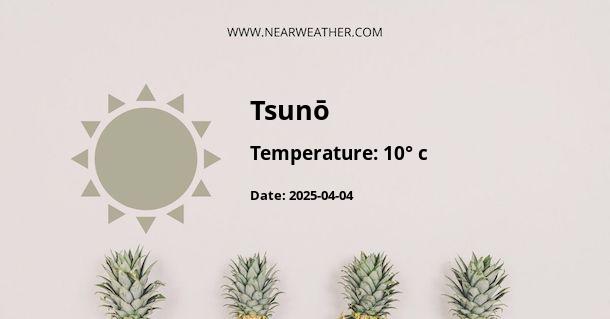Tsunō, JP: Climate and Weather Year Round
Tsunō is a beautiful coastal town located in Japan. It is known for its scenic views, rich cultural heritage, and pleasant climate. Let's delve into the details of Tsunō's climate and weather year-round.
Geographical Location
Tsunō is situated on the western coast of Japan, specifically in the Wakayama Prefecture. Its geographic coordinates are approximately 33.7772° N latitude and 135.2250° E longitude. The town is nestled between the Pacific Ocean to the south and the Kii Mountains to the north, which greatly influence its climate.
Climate Classification
Tsunō falls under the humid subtropical climate classification (Cfa) according to the Köppen climate classification system. This means that the town experiences hot, humid summers and mild winters with ample rainfall throughout the year.
Seasonal Overview
Now, let's take a closer look at the weather conditions in Tsunō during each season:
Spring (March to May)
Spring in Tsunō is characterized by mild temperatures and gradually increasing rainfall. The average high temperatures range from 15°C (59°F) in March to 22°C (72°F) in May. The cherry blossoms bloom during this season, attracting visitors from near and far to witness the town's picturesque landscapes.
Summer (June to August)
Summer in Tsunō brings warm and humid weather. The average high temperatures range from 26°C (79°F) in June to 31°C (88°F) in August. The town experiences a significant amount of rainfall, especially during the rainy season known as "Tsuyu" in June and July. It is advisable to pack lightweight and breathable clothing to cope with the heat and humidity during this time.
Fall (September to November)
Fall in Tsunō is characterized by mild and pleasant temperatures. The average high temperatures range from 28°C (82°F) in September to 19°C (66°F) in November. The humidity decreases, making it a comfortable time to explore the town and its surroundings. The autumn foliage paints the landscapes with vibrant colors, making it a popular season for tourists.
Winter (December to February)
Winter in Tsunō is relatively mild, but cooler compared to other seasons. The average high temperatures range from 13°C (55°F) in December to 9°C (48°F) in February. While snowfall is not common in Tsunō, the nearby Kii Mountains often receive a fair amount of snow, creating a picturesque backdrop for the town.
Precipitation and Sunshine
Tsunō receives a substantial amount of rainfall throughout the year. The average annual precipitation is approximately 1,600 millimeters (63 inches). The rainiest months are June and July, during the Tsuyu rainy season. On the other hand, the driest months are February and September.
As for sunshine, Tsunō enjoys an average of around 1,800 hours of sunshine annually, with the sunniest months being July and August.
Severe Weather Events
While Tsunō is generally not prone to severe weather events, it is important to note that Japan as a whole is susceptible to typhoons. Typhoon season typically occurs between June and October. These tropical cyclones can bring strong winds, heavy rain, and storm surges to coastal areas. Visitors planning a trip to Tsunō during this period should stay informed about any potential typhoon activity and follow the instructions of local authorities.
Conclusion
Tsunō, Japan, experiences a humid subtropical climate, with hot and humid summers and mild winters. The town's beautiful coastal location and proximity to the Kii Mountains create a unique climate that attracts visitors throughout the year. Whether you prefer the cherry blossoms of spring, the vibrant foliage of autumn, or the warm coastal breezes of summer, Tsunō has something to offer in every season.
A - Tsunō's Latitude is 32.250000 & Longitude is 131.566666.
A - Weather in Tsunō is 14° today.
A - Climate Conditions in Tsunō shows overcast clouds today.
A - Humidity in Tsunō is 66% today.
A - Wind speed in Tsunō is 4.28 km/h, flowing at 295° wind direction. today.
